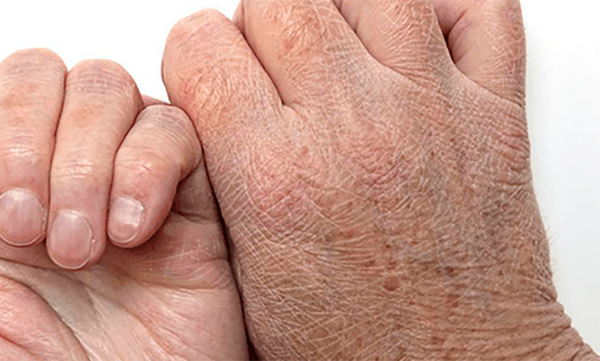The dry skin can be an indicator that something is not working well in our body. First of all, it can be a warning sign that we are not sufficiently hydrated or that we are exposing ourselves too much to the sun.
Sometimes we coexist so long with some issues that we incorporate them as usual and we stop paying attention to them. This is the case many times of the largest and most extensive organ that the human body has, which is the skin. If we notice it dry, deteriorated, this generates redness and itching.
When the skin is dry is because it is having difficulty retaining moisture and begins to flake generating irritation and itching.
The dryness of the skin can manifest itself in different ways. We can notice the white scales on our forearms or it can also be noticed in the cracks that form on the heels or the soles of the feet. In this situation, the dryness can be such that even the skin hurts and bleeds.
Normally with the use of some moisturizer that contains coconut or cucumber essences we can recover the health of the skin, but if after dedicating time and care we notice that there have been no significant changes, then we must make a consultation with a specialist because this change On the skin it can be a symptom of something a little more complex.
We are going to point out some of the diseases that manifest themselves with changes in the skin. Although it is not a determining factor, it could be an indicator.
Let us pay attention to these particular cases:
– Thyroid:
The thyroid gland regulates the activity of cells in the body but when levels are low, which is what we call hypothyroidism, our cells “become disoriented” and we begin to feel sensations of cold, constipation, tiredness, depression and even memory loss.
And what does the skin have to do with all this? Well, thyroid hormones have receptors in the skin and are involved in the formation of new cells that replace the previous ones. When it fails to fulfill this function properly we notice dry, scaly and rough skin to the touch.
If this is your case you should start consuming foods rich in iodine, zinc, and selenium in addition to following the instructions of your doctor to control your hormone levels.
– Diabetes:
When sugar levels remain high for prolonged periods the body loses fluid and this has a direct impact on the dryness of the skin because it dehydrates quickly. Diabetes also interferes with perspiration, a process that moisturizes the skin naturally. One of the main problems with the dryness generated by diabetes is that the skin can crack and thus be prone to dangerous infections, especially because diabetic patients have problems healing wounds.
– Kidney problems:
Did you know that kidney problems do not always manifest in a concrete way? Sometimes, we can have urinary tract infections and not know it. This is very common in pregnant women. The kidneys are responsible for maintaining the balance between minerals and nutrients in the blood when they can not process the fluids will generate itching and dryness in the skin.
It is important to pay attention to this symptom since as we said before, it is not easy to detect a kidney problem until it is already at a very advanced stage. If you have problems with blood pressure, or you are diabetic or have a family history as well as if you were over 60 years old, it is important to check regularly.
– Skin cancer:
The main problems with melanomas are that the cells that compose it reproduce more quickly than any other cell in the body. This makes it important to take it in time so that it does not spread to other parts of the body or internal organs. This type of cancer is very worrying because they usually appear due to excessive exposure to the sun, in addition to other external agents. They usually appear on the face, the most visible and most exposed to the sun, although the arms or back can also be found.
In case you suddenly notice changes in the skin or that are strange to you because of their shape or color, it is necessary to consult a specialist.
